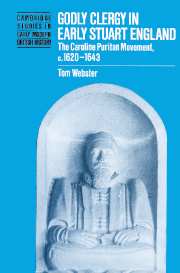Book contents
- Frontmatter
- Contents
- Acknowledgments
- List of abbreviations
- Introduction
- Part I Society, clerical conference and the Church of England
- Part II The godly ministry: piety and practice
- Part III ‘These uncomfortable times’: conformity and the godly ministers 1628–1638
- Part IV ‘These Dangerous Times’: the Puritan Diaspora 1631–1643
- 13 John Dury and the godly ministers
- 14 Choices of suffering and flight
- 15 The ‘non-separating Congregationalists’ and early Massachusetts
- 16 Thomas Hooker and the Amesians
- 17 Alternative ecclesiologies to 1643
- 18 Conclusion
- Index
- Cambridge Studies in Early Modern History
15 - The ‘non-separating Congregationalists’ and early Massachusetts
Published online by Cambridge University Press: 04 November 2009
- Frontmatter
- Contents
- Acknowledgments
- List of abbreviations
- Introduction
- Part I Society, clerical conference and the Church of England
- Part II The godly ministry: piety and practice
- Part III ‘These uncomfortable times’: conformity and the godly ministers 1628–1638
- Part IV ‘These Dangerous Times’: the Puritan Diaspora 1631–1643
- 13 John Dury and the godly ministers
- 14 Choices of suffering and flight
- 15 The ‘non-separating Congregationalists’ and early Massachusetts
- 16 Thomas Hooker and the Amesians
- 17 Alternative ecclesiologies to 1643
- 18 Conclusion
- Index
- Cambridge Studies in Early Modern History
Summary
For those godly ministers who emigrated and for those who stayed, for those who were silenced and those who survived in their cures alike, we have seen the 1630s as a decade of challenge and trial, overturning settled practices and assumptions, and forcing fissures between apparently likeminded men on issues of ceremonial conformity and emigration. These fissures were not so deep as to prevent continued fellowship or to make less important the settled social patterns of godly religion. The harshest words of condemnation and the triumph of mutual incomprehension were reserved for the 1640s: this decade saw the godly scattered across the face of the world, speaking different languages. In this, the final act of the Puritan diaspora, ecclesiology was of paramount importance, the single issue upon which final agreement proved utterly unobtainable. We have become familiar with the debates over church government in the Westminster Assembly and with the parallel pamphlet warfare. These events will receive little attention here, because the Tower of Babel was a long time falling; rather, I am concerned with the pre-history of these events, and with tracing some of the forces involved.
The divisions over ecclesiology of the 1640s were not simply the eruption of longstanding conflicts within the godly ministry, the final, public battle of a guerrilla war that had been fought throughout the century by proto-Congregationalists and proto-Presbyterians. If nothing else has been demonstrated in the preceding pages, it must be clear that those ministers identified, and identifying themselves, as godly formed a society in which men who would eventually express an allegiance to opposing extremes of polity would find a place.
- Type
- Chapter
- Information
- Godly Clergy in Early Stuart EnglandThe Caroline Puritan Movement, c.1620–1643, pp. 286 - 298Publisher: Cambridge University PressPrint publication year: 1997



